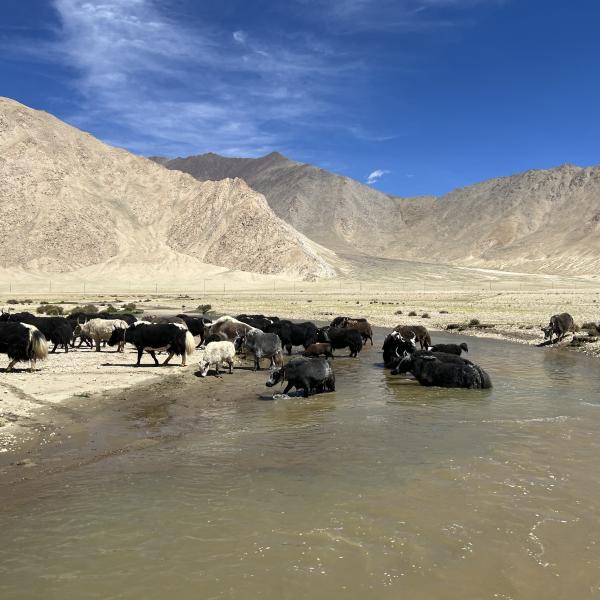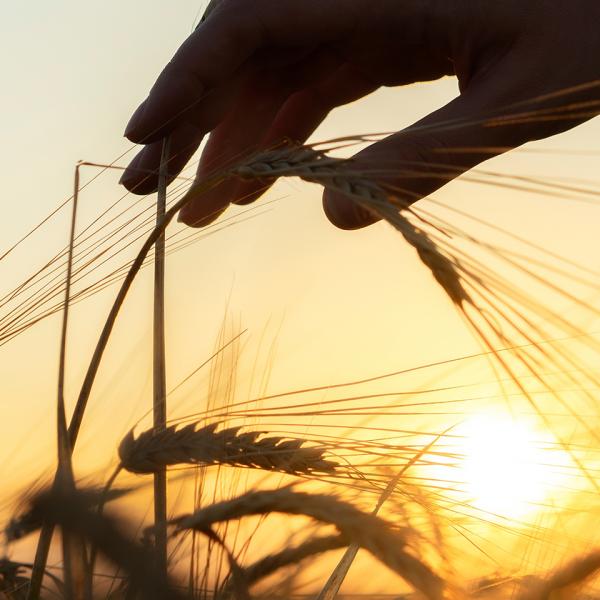SELECTED PUBLICATIONS (see CV for the full list and google scholar)
Zhang, Z., H. Lu, S. Wangdue, X. Chen, L. Tang, H. Xu, J. Song, P. Vaiglova and X. Liu, In press. Sequential isotope analyses of enamel bioapatite on the Tibetan Plateau reveal sheep and goat provisioning at high elevation environment, 3000-2200 BP. Antiquity.
Sun, Y., M. Ritchey, H. Zhong, L. Tang, E. Sergusheva, T. Shi, J. Song, H. Li, G. Dong and X. Liu, In press. Gran size variations of millets and cooking techniques across Asia between the late fourth and first millennium BCE. Antiquity.
Liu, X. and M. K. Jones, 2024. Needs for a conceptual bridge between biological domestication and early food globalization. Proceedings of the National Academy of Sciences of the USA, 121 (16), e2219055121. Abstract
Chen, X., H. Lü, X. Liu and M. D. Frachetti, 2024. Geospatial modelling of farmer-herder interactions maps cultural geography of Bronze and Iron Age Tibet, 3600-2200 BP. Scientific Reports, 14, 2010. Open access article
Chen, N. Z. Zhang, J. Hou, J. Chen, X. Gao, L. Tang, S. Wangdue, X. Zhang, M-H. S. Sinding, X. Liu, J. Han, H. Lü, C. Lei, F. Marshall and X. Liu, 2023. Evidence for early domestic yak, taurine cattle, and their hybrids on the Tibetan Plateau. Science Advances, 9, eadi6857. Open access article
Li, H., Y. Sun, Y. Yang, Y. Cui, L. Ren, H. Li, G. Chen, P. Vaiglova, G. Dong and X. Liu, 2022. Distinct water and soil management by first wheat and barley cultivators in north China. Antiquity, 96(390): 1478-1494. Abstract
Ritchey, M. M., Y. Sun, G. Motuzaite Matuzeviciute, S. Shaoda, A. K. Pokharia, M. Spate, L. Tang, J. Song, H. Li, G. Dong, P. Vaiglova, M. Frachetti and X. Liu, 2022. The Wind that Shakes the Barley: the role of eastern Eurasian cuisines and environments on barley grain size. World Archaeology, 53(1): 1-18. Abstract
Tian, D., Y. Sun, R.M. Melissa, T. Xi, M. Ren, J. Ma, J. Wang, Z. Zhao, X. Ling and X. Liu, 2022. Varying cultivation strategies in eastern Tianshan corresponded to growing pastoral lifeways between 1300 BCE and 300 CE. Frontiers in Ecology and Evolution, 10: 966366. Open access article
Reid, R.E.B., J.T. Waples, D.A. Jensen, C.E. Edwards and X. Liu, 2022. Climate and vegetation and their impact on C and N isotope ratios in bat guano. Frontiers in Ecology and Evolution, 10: 929220. Open access article
Vaiglova, P., R. E. B. Reid, E. Lightfoot, S. E. Pilaar Birch, H. Wang, G. Chen, S. Li, M. K. Jones and X. Liu, 2021. Localized management of non-indigenous animal domesticates in northwestern China during the Bronze Age. Scientific Reports, 11: 15764. Open access article
Sanborn, L. H., R. E. B. Reid, A. S. Bradley and X. Liu, 2021. The effect of water availability on the carbon and nitrogen isotope composition of a C4 plant (pearl millet, Pennisetum glabucum). Journal of Archaeological Sciences, 28: 103047. Abstract
Liu, X., and R. E. B. Reid, 2020. The prehistoric roots of Chinese cuisines: Mapping staple food systems of China, 6000 BC -220 AD. PLOS ONE, 15(11), e0240930. Open access article
Zhang, Z., Z. Chen, F. Marshall, H. Lü, X. Lemoine, T. Wangyal, T. Dorje and X. Liu, 2019. The importance of hunting of diverse animals at Xiaoenda (5000 - 4000 BP), East Tibet. Quaternary International, 529, 38-46. Abstract
Liu, X., P.J. Jones, G. Motuzaite Matuzeviviute, H.V. Hunt, D.L. Lister, T. An, N. Przelomska, C.J. Kneale, Z. Zhao and M.K. Jones, 2019. From ecological opportunism to multi-cropping: mapping food globalisation in prehistory. Quaternary Science Reviews, 206(15), 21-8. Abstract
Liu, X., G. Motuzaite Matuzeviciute & H.V. Hunt, 2018. From a fertile idea to a fertile arc: The origins of broomcorn millet 15 years on, in Far from the Hearth: Essays in Honour of Martin K. Jones, eds. E. Lightfoot, X. Liu & D.Q. Fuller. Cambridge: McDonald Institute Conversations, 155-64. Abstract
Liu, X., D.L. Lister, Z. Zhao, C.A. Petrie, X. Zeng, P.J. Jones, R. Staff, A.K. Pokharia, J. Bates, R.N. Singh, S.A. Weber, G. Motuzaite Matuzeviviute, G. Dong, H. Li, H. Lü, H. Jiang, J. Wang, J. Ma, D. Tian, G. Jin, L. Zhou, X. Wu & M.K. Jones, 2017. Journey to the East: diverse routes and variable flowering times for wheat and barley en route to prehistoric China. PLOS ONE, 12(11), e0209518. Open access article
Liu, X., Z. Zhao & M.K. Jones, 2017. From people's commune to household responsibility: Ethnoarchaeological perspectives of millet production in prehistoric northeast China. Archaeological Research in Asia, 11, 51-7. Abstract
Liu, X., D.L. Lister, Z.-Z. Zhao, R.A. Staff, P.J. Jones, L.-P. Zhou, A.K. Pokharia, C.A. Petrie, A. Pathak, H.-L. Lu, G. Motuzaite Matuzeviciute, J. Bates, T.K. Pilgram and M.J. Jones, 2016. The virtues of small grain size: Potential pathways to a distinguishing feature of Asian wheats. Quaternary International, 426(28), 107-9. Abstract
Ren, X., X. Lemoine, D. Mo, T.R. Kidder, Y. Guo, Z. Qin & X. Liu, 2016. Foothills and intermountain basins: Does China's Fertile Arc have a 'Hilly Flanks'? Quaternary International, 426(28), 86-96. Abstract
Liu, X., D. Fuller and M. K. Jones. 2015. Early agriculture in China. In The Cambridge World History - Volume II: A world with agriculture, 12,000 BCE-500CE, edited by G. Barker and C. Goucher. Cambridge: Cambridge University Press, 310-334. Abstract
Chen, F., F. Dong, D. Zhang, X. Liu, X. Jia, C. An, M. Ma, Y. Xie, L. Barton, X. Ren, Z. Zhao, X. Wu and M. K. Jones. 2015. Agriculture facilitated permanent human occupation of the Tibetan Plateau after 3600 B.P. Science 347 (6219), 248-250. Abstract
Liu, X., E. Lightfoot, T. C. O'Connell, H. Wang, S. Li, L. Zhou, Y. Hu, G. Motuzaite Matuzeviciute and M. K. Jones. 2014. From necessity to choice: dietary revolutions in west China in the second millennium BC. World Archaeology 46 (5), 661-680. Abstract
Liu, X. and M. K. Jones. 2014. Food globalization in prehistory: top down or bottom up? Antiquity 88 (341), 956-963. Abstract
Liu, X., M. K. Jones, Z. Zhao, G. Liu and T. C. O'Connell. 2012. The earliest evidence of millet as a staple crop: New light on Neolithic foodways in North China. American Journal of Physical Anthropology 149 (2), 238-290. Abstract
Jones, M. K. and X. Liu. 2009. Origins of agriculture in East Asia. Science 324 (5928), 730-731. Abstract
Liu, X., H. V. Hunt and M. K. Jones. 2009. River valleys and foothills: changing archaeological perceptions of north China's earliest farms. Antiquity 83 (319), 82-95. Abstract
EDITED VOLUME AND SPECIAL ISSUES:
Lightfoot, E., X. Liu and D. Q. Fuller, eds. 2018. Far from the Hearth: Essays in Honour of Martin K. Jones. Cambridge: McDonald Institute Conversations.
Xinyi Liu, Giedre Motuzaite Matuzeviciute, Shinya Shoda and Petra Vaiglova, eds. 2022/23. Research Topic: Effects of Novel Environments on Domesticated Species. Frontiers in Ecology and Evolution.
Jianping Zhang, Ying Guan and Xinyi Liu, eds. 2022/23. Research Topic: Frontiers in the Study of Ancient Plant Remains. Frontiers in Plant Science.



